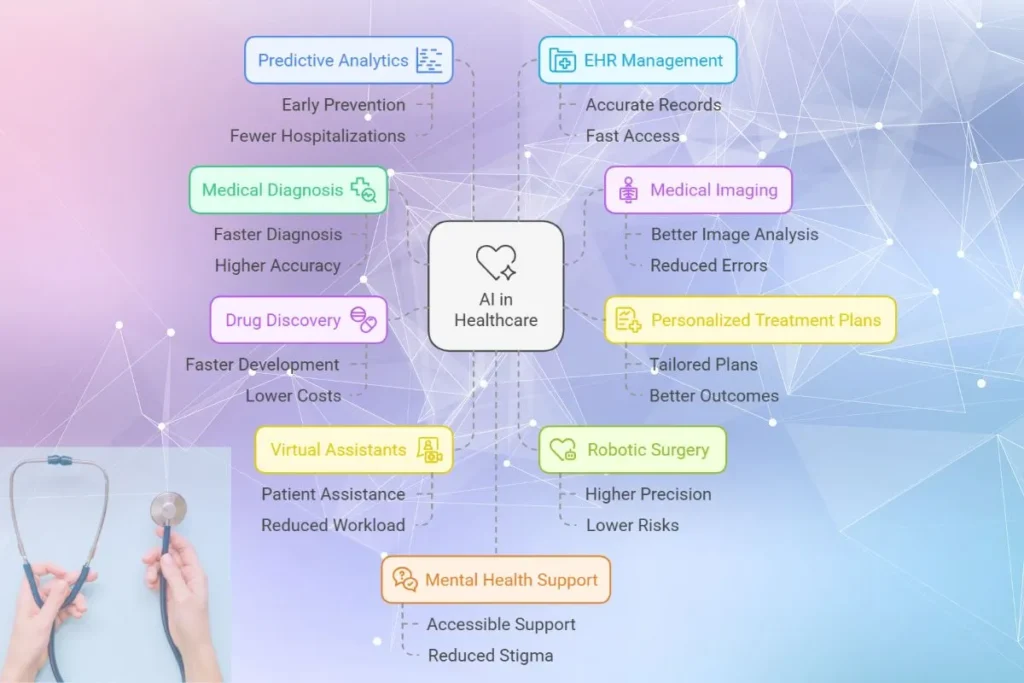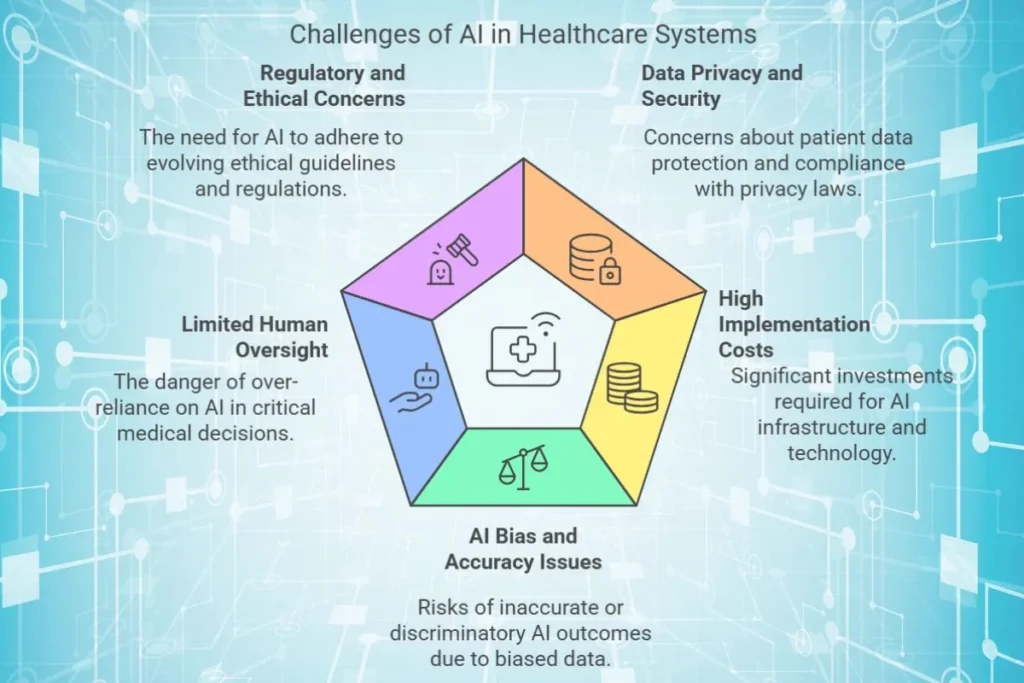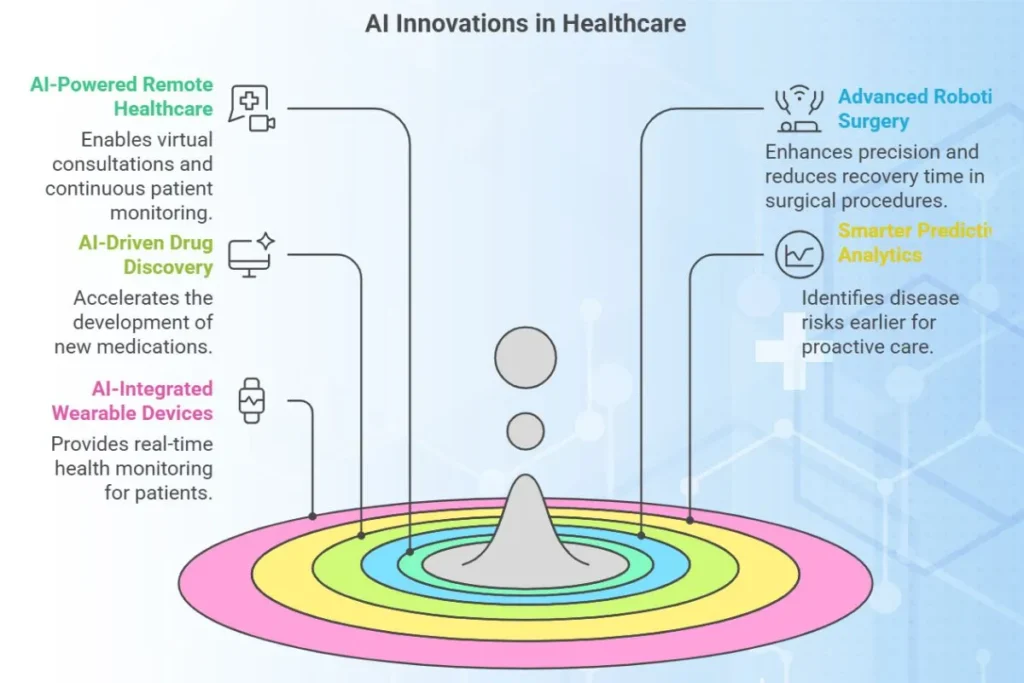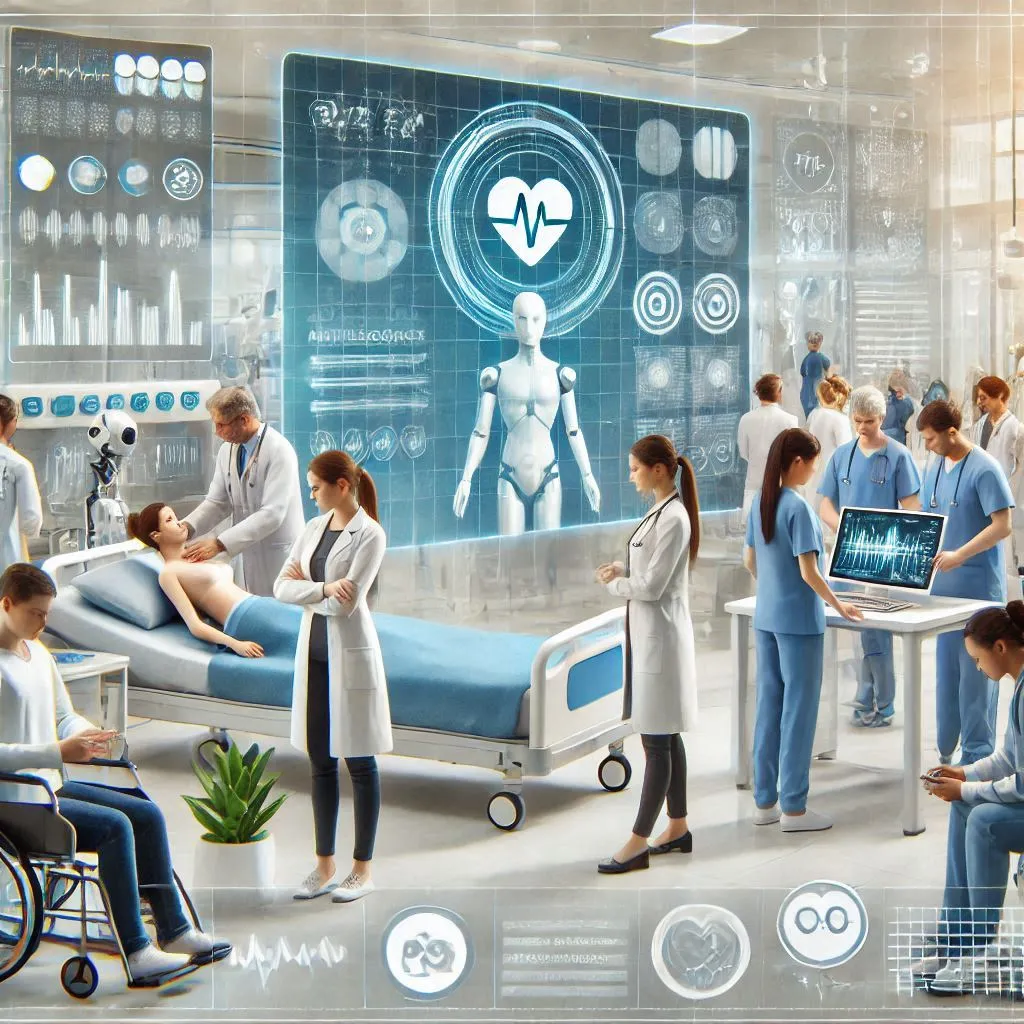Artificial intelligence (AI) is transforming healthcare sector by enhancing diagnosis, improving treatment and optimizing administrative processes. AI driven solutions help doctors to make more accurate decisions, detect diseases earlier and improve patient outcomes.
In this blog article, we shall discuss, how does artificial intelligence improve healthcare? By using technologies like AI assisted surgeries and virtual healthcare assistants, the role of AI in healthcare is expanding at progressive rate.
Main Role of Artificial Intelligence in Healthcare
AI is used in many areas of healthcare sector to improve efficiency, accuracy and patient care. Below are some of the most important applications of AI in healthcare.
1. AI in Medical Diagnosis
AI plays a important role in diagnosing diseases with high precision. Machine learning models analyze medical images, test results and patient history to detect illnesses such as cancer, heart disease and neurological disorders.
Benefits:
- Faster diagnosis
- Higher accuracy
- Early disease detection
Example: Google’s DeepMind AI identifies eye diseases with accuracy comparable to leading ophthalmologists.
2. AI Powered Medical Imaging
AI enhances the interpretation of medical scans such as MRI, CT scans and X-rays. It highlights abnormalities that may be missed by human eyes. This makes faster and more reliable diagnoses.
Benefits:
- Better image analysis
- Reduced diagnostic errors
- Faster results
Example: AI based imaging tools can detect lung cancer nodules with greater accuracy than traditional radiology methods.
3. AI in Personalized Treatment Plans
AI uses patient data to create customized treatment plans. By analyzing genetics, medical history and lifestyle, AI recommends the most effective treatment for each individual.
Benefits:
- Suitable treatment plans
- Better patient outcomes
- Fewer trial and error treatments
Example: IBM Watson for Oncology suggests personalized cancer treatment options based on clinical data and research.
4. AI in Drug Discovery and Development
AI accelerates drug discovery by analyzing large datasets to identify promising drug candidates, which reduces research costs and timelines.
Benefits:
- Faster drug development
- Lower costs
- Higher success rates in clinical trials
Example: AI helped to discover Halicin, an antibiotic effective against drug resistant bacteria.
5. AI Powered Virtual Assistants and Chatbots
AI powered chatbots provide round the clock healthcare support by answering patient queries, scheduling appointments and sending medication reminders.
Benefits:
- 24/7 patient assistance
- Reduced administrative workload
- Enhanced patient engagement
Example: Babylon Health’s AI chatbot offers medical guidance based on user symptoms.
6. AI in Robotic Surgery
AI powered surgical robots assist in complex procedures, which improves accuracy and reduces risks.
Benefits:
- Higher surgical precision
- Faster recovery time
- Lower risk of complications
Example: The Da Vinci Surgical System enables minimally invasive surgeries with enhanced precision.
7. AI in Predictive Analytics and Preventive Care
AI predicts disease outbreaks and identifies high risk patients, which allowing them for early intervention and preventive care.
Benefits:
- Early disease prevention
- Fewer hospitalizations
- Improved public health
Example: AI predicted COVID-19 outbreaks by analyzing global travel and health data trends.
8. AI in Electronic Health Records (EHR) Management
AI improves the accuracy and efficiency of managing patient records by automating data entry and reducing human errors.
Benefits:
- More accurate records
- Less administrative burden
- Faster access to patient information
Example: AI powered tools automate EHR updates, which allows doctors to spend more time on patient care.
9. AI in Mental Health Support
AI supported mental health applications provide users with counseling, therapy techniques and emotional support through virtual assistants.
Benefits:
- Easily accessible mental health support
- Reduced stigma around seeking help
- 24/7 availability
Example: Woebot, an AI chatbot, offers cognitive behavioral therapy (CBT) techniques for mental wellness.
10. AI in Medical Research
AI helps researchers to analyze vast datasets, which speeds up discoveries and improves medical research outcomes.
Benefits:
- Faster research breakthroughs
- Better data analysis
- Enhanced scientific discoveries
Example: AI helped analyze COVID-19 patient data to identify risk factors and effective treatment strategies.

Challenges of AI in Healthcare
Despite its benefits, AI in healthcare faces several challenges:
1. Data Privacy and Security
AI relies on patient data, which raises concerns about security, data breaches and compliance with privacy regulations.
2. High Implementation Costs
Integrating AI into healthcare systems requires substantial investment in infrastructure and technology.
3. AI Bias and Accuracy Issues
If AI models are trained on biased or incomplete data, they may produce inaccurate or discriminatory results.
4. Limited Human Oversight
AI should assist healthcare professionals, not replace them. Over reliance on AI could lead to errors in critical medical decisions.
5. Regulatory and Ethical Concerns
AI in healthcare must comply with evolving regulations and ethical guidelines to ensure responsible usage.

The Future of AI in Healthcare
AI will continue to revolutionize healthcare with following innovations:
- AI powered remote healthcare for virtual consultations and patient monitoring.
- Advanced robotic surgery for increased precision in surgical procedures.
- AI driven drug discovery to accelerate new medication development.
- Smarter predictive analytics for identifying disease risks earlier.
- AI integrated wearable devices to provide real time health monitoring.
AI has the potential to make healthcare more efficient, cost effective and patient friendly. As AI technology advances, it will become an essential tool in hospitals, clinics and research institutions worldwide.

Conclusion
AI is reshaping healthcare by enhancing diagnosis, treatment and overall patient care. It enables early disease detection, creates personalized treatment plans and automates medical processes to improve efficiency. Its advantages are far outweigh the risks.
Healthcare providers that integrate AI technology into their systems will experience improved patient outcomes, reduced costs and greater efficiency. The future of AI in healthcare looks promising, with ongoing developments leading to new innovations and better global health.

